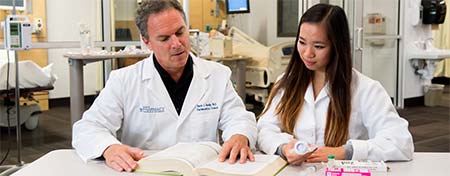Introduction to Pharmacy
Pharmacy is the branch of science that deals with the research, development and distribution of medicines and drugs. The pharmacy field prepares the individuals under the supervision of pharmacists to prepare medications, provide medications and related assistance to patients and manage pharmacy clinical and business operations.
The pharmacy is the health profession that links the health sciences with the chemical sciences and it is charged with ensuring the safe use of medication. The scope of pharmacy includes more traditional roles such as compounding and dispensing medications on the orders of physicians and it also includes more modern services related to patient care, including clinical services, reviewing medications for safety and efficacy and providing drug information.
Brief about Doctor of Pharmacy (Pharm D)
Doctor of Pharmacy (Pharm D) is a 6-year doctorate level course in pharmacy. The course aims to prepare the students to manage the patient medication therapy and improve patient outcomes. The course is designed to train the students about various topics like clinical pharmacy, pharmacy practice and pharmaceutical care. The students of Pharm D will gain skills and extensive knowledge in diagnosis and treatment of diseases, selection and therapeutic usage of drugs monitoring of patients etc.
Eligibility for Pharm D
- The students who have completed their PUC or 10+2 with Physics, Chemistry, Zoology, Botany as compulsory subjects from recognised board.
- The students who have completed D.Pharma courses from recognised institutes approved by Pharmacy Council of India.
Admission Procedures
The eligible students can take admission to Doctor of Pharmacy (Pharm D) through two modes. The first one is merit admission and the second one is direct admission.
1. Merit Admissions
The eligible students who are interested in merit seats are required to appear for the CET entrance exam conducted by Karnataka Examination Authority (KEA). The students after qualifying the exam are required to undergo the counselling sessions for getting admissions to merit seats in colleges. The fees are fixed by the government and are nominal.
2. Direct Admission
The other mode of admission is called direct admissions. The students can take admissions to colleges under direct admissions procedures. The students of direct admissions are given special privileges, where they are not required to appear for any entrance exams and are also exempted from attending counselling sessions. They can choose their colleges and book confirmed seats even before the college starts. The fees are slightly higher for direct admissions.
Syllabus for Doctor of Pharmacy (Pharm D)
The students of Doctor of Pharmacy (Pharm D) will be studying the following subjects:
- Human Anatomy and Physiology
- Pharmaceutics
- Medical Biochemistry
- Pharmaceutical Organic Chemistry
- Remedial Mathematics and Remedial Biology
- Pathophysiology
- Pharmaceutical Microbiology
- Pharmacognosy & Phytopharmaceuticals
- Pharmacology
- Community Pharmacy
- Pharmacotherapeutics
- Pharmaceutical Analysis
- Pharmaceutical Jurisprudence
- Medicinal Chemistry
- Pharmaceutical Formulations
- Hospital Pharmacy
- Clinical Pharmacy
- Biostatistics and Research Methodology
- Biopharmaceutics and Pharmacokinetics
- Clinical Toxicology
- Clinical Research
- Pharmacoepidemiology & Pharmacoeconomics
- Clinical Pharmacokinetics & Pharmacotherapeutic Drug Monitoring
- Clerkship
- Community Pharmacy
Future Scope for Doctor of Pharmacy (Pharm D)
The Pharm D students can explore a broad spectrum of lucrative job opportunities in a variety of sectors. They can start their own pharmacy shops in communities. They can even take up pharmacy distribution agencies. They can join various pharmaceutical companies and pharmaceutical distribution companies. They can join pharmacy colleges and take up teaching as assistant professors.
Job roles available for Doctor of Pharmacy (Pharm D) students
Some of the job roles available for Doctor of Pharmacy (Pharm D) students are:
- Clinical Pharmacist
- Hospital Pharmacy Director
- Hospital Staff Pharmacist
- Pharmacist
- Retail Staff Pharmacist
- Drug Experts
- Nutritionists
- Medical Writer
- Pharmaceutical Advisor
Earning Potential
The Doctor of Pharmacy (Pharm D) students will be easily earning about 4 lakhs to 6 lakhs per annum as freshers. The experienced professionals will be earning about 6 lakhs to 10 lakhs per annum. The salary varies according to recruiter and location.
Companies Hiring Doctor of Pharmacy (Pharm D) students
Some of the top companies hiring Pharm D students are:
- Himalaya Drug Company
- Cipla
- Glaxo smith
- Novo Nordisk
- Amway
- Abbot
- Cavin Care
Conclusion
The pharmacy field is always considered as the evergreen field. There has been no instance of any recession in the pharmacy sector till date. The development of new technologies and methodologies have helped the pharmacy field to reshape according to the changing times. The increased number of patients and discovery of new diseases has forced the pharmaceutical drugs to research and develop new drugs and treatments to treat such diseases. The eligible students who want to build their career in the field of pharmacy can join the Doctor of Pharmacy (Pharm D) course and get opportunities to work in lucrative job roles in pharmaceutical companies.





